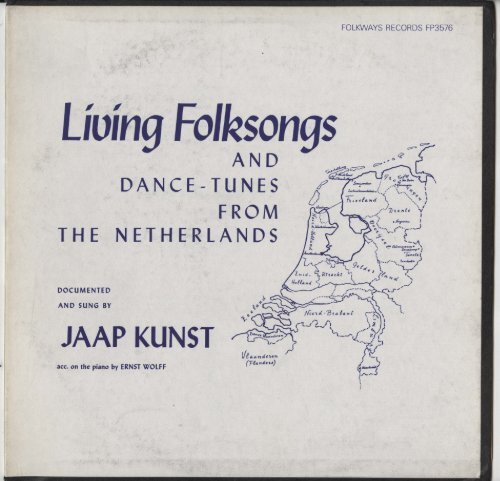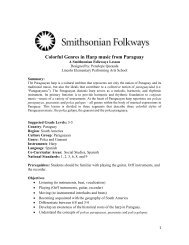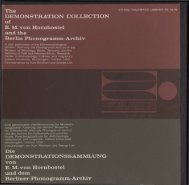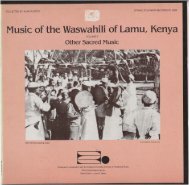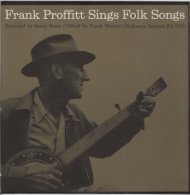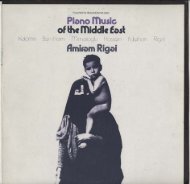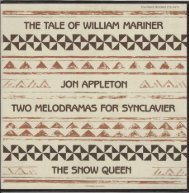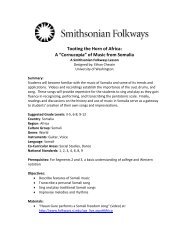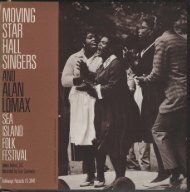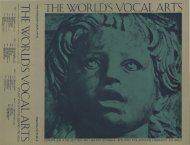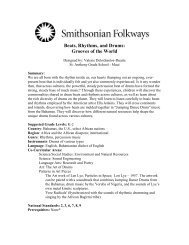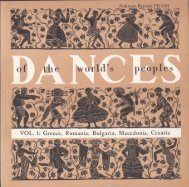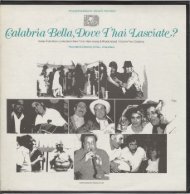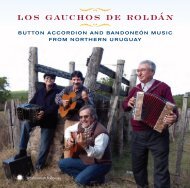You also want an ePaper? Increase the reach of your titles
YUMPU automatically turns print PDFs into web optimized ePapers that Google loves.
FOLKWAYS <strong>RECORDS</strong> FP3576<br />
LIVING FOLKSONGS<br />
AND DANCE-TUNES<br />
FROM THE NETHERLANDS<br />
documented and sung by<br />
JMP KUNST<br />
SONGS<br />
1. Fivelgoer Kerstlied (Christmas Song)<br />
2. Heden Is De Grootste Dag<br />
(Today Is The Greatest Of All Days)<br />
3. Daar Nu Het Feest Van Pasen Is . .•<br />
(Because It Is Now The Easter Festival)<br />
4. Vier Fransjes Op De Baan<br />
(Four Frenchmen On The Highway)<br />
5. Drie Schuintamboers<br />
(Three Naughty Drummers)<br />
6. De Wonnerlieke Raize (The Miraculous Voyage)<br />
7. Wie Wil Er Mae Naar Wieringan Varen?<br />
(Who Will Go With Me To Wieringen?)<br />
8. Krelis En Betje (Cornelius and Bess)<br />
9. Daar Boven Uit Het Vensterke . . .<br />
(Upstairs, Out Of The Window . . . )<br />
10. Mien Mouder Dei Wol Mie Gaev'n . . .<br />
(My Mother Tried To Force Me . . .)<br />
11 . Siemenmanj Oet Vrijen<br />
(Manikin Simeon Goes Courting)<br />
12. Het Matrozenmeisje (The Sailor-Girl)<br />
13. Hoe Laat Is 'T? - Twaalf Uur<br />
(What Time Is It? - Midnight)<br />
14. 'S Morgans Is Den Riep So Kold . ..<br />
(At Dawn The Hoarfrost Is So Cold . • .)<br />
15. Pinksterliedje (Song Of The Whitsun-Flower)<br />
16. Toen Ik Jong Was ... (When I Was Young .. .)<br />
17. Ain Boer Wol Noar Zien Noaber Tou • . .<br />
(A Farmer Wanted To Go To His Neighbor •.. )<br />
18. Te Laren, Te Laren, Te Laren Op De Dom .• .<br />
(At Laren, At Laren, At Laren, On The Dam • .)<br />
19. De Kleren Van De Boer<br />
(The Clothes Of The Peasant)<br />
20. Een Patertje Zou Naar Frankrijk Gaan •.•<br />
(A Pilgrim Set Out For France • • .)<br />
DANCES<br />
21. Flip (Philip)<br />
22. E Le Signon<br />
23. Trij 'Ris Trapje (Stamp Three Times)<br />
24. Jenneke (Jeanny)<br />
25. Waarom Koken De Boeren De Pap Zo Dun ...<br />
(Why Do The Peasants Make Their Porridge<br />
So Watery . . . )<br />
26. De Marsch Van Bonaparte<br />
(The March of Bonaparte)<br />
27. Boerenplof (The Farmer's Bump)<br />
28. Polka<br />
29. Boer, Wat Zag Je Van Mijn Kippen?<br />
(Farmer, Do You Like My Chickens?)<br />
30. Skotse Trije (Scottish Three)<br />
31. Swart Laat Hem Scheren .••<br />
(Mr. Swart Allowed Himself To Be Shaved . •. )<br />
DESCRIPTIVE NOTES ARE INSIDE POCKET<br />
© 1956 FOLKWAYS <strong>RECORDS</strong> AND SERVICE CORP.<br />
701 SEVENTH AVE., N;Y.C., U.S.A.<br />
FOLKWAYS <strong>RECORDS</strong> FP3576
FOLKWAYS <strong>RECORDS</strong> AlbuIn No . FP 3 576<br />
Copyright ©1956. Folkways Records and Service Corp., 165 W 46th St. NYC USA<br />
LIVING FOLKSONGS<br />
AND DANCE-TUNES FROM<br />
THE NETHERLANDS<br />
acc. on the piano by ERNST WOLFF<br />
FOLKWAYS <strong>RECORDS</strong> S SERVICE CORP. N. Y. U.S.A.
IV. VIER FRANSJES OP DE BAAN (Four Frenchmen<br />
on the Highway).<br />
A song from Flanders, sung at fairs. It tells us the<br />
story of a noble lady who, returning with her servant<br />
from the town of Namen to her father's castle, is<br />
assaulted by four French highwaymen. At the<br />
crucial moment -- the scoundrels have already killed<br />
the servant and are now attacking the lady herself -a<br />
Spanish knight appears on the scene and, in a<br />
fierce struggle, in which he is severely wounded, he<br />
succeeds in killing all four highwaymen. The lady<br />
brings him to her father's castle, nurses him till he<br />
has recovered, and the end, of course, is a wedding<br />
party. The fine archaic melody, in alternately 4/4<br />
and 2/4, is pure Dorian. The record gives only the<br />
first two stanzas.<br />
1. WeI vrienden, blijft eens staan<br />
En hoort dit lied eens aan,<br />
't Geen ik U zal verklaren,<br />
Hoe dat een schoon madam<br />
Buiten Namen is gevaren,<br />
Die om vermaak daar kwam.<br />
2. Met haren serviteur<br />
Dacht zij aan geen getreur,<br />
Maar raakte in groot lijden:<br />
Vier Fransjes op de baan<br />
Sprongen uit het bos bezijden,<br />
Vie len deez' jonkvrouw aan.<br />
(Translation)<br />
1. Friends, halt a moment<br />
And hear my song<br />
That tells you<br />
How a beautiful lady<br />
Came from the town of Namen<br />
That she visited on a pleasure trip.<br />
2. Accompanied by her servant,<br />
She was quite unconcerned,<br />
But she got in a fearful prrdicament,<br />
For, at once, four French highwaymen<br />
Sprung out of the bush<br />
And assailed this young lady.<br />
V. DRIE SCHUINTAMBOERS (Three Naughty<br />
Drummers).<br />
This song originated in Franche Comt: and its title<br />
and first line ran then: "Trois jeunes tambours ".<br />
From there it came to German speaking countries,<br />
and the initial words changed into "Drei sch'one<br />
Tamburn ". Then it came to the Netherlands, and<br />
again the text was translated. The original "jeunes"<br />
(young), that changed into the German "schon"<br />
(beautiful), became now "schuin ,. (equivocal, indecent,<br />
naughty).<br />
There are some more stanzas than those recorded,<br />
in which the exalted position of the principal drummer's<br />
father, and the rather discreditable profession of his<br />
mother are unveiled; they have been omitted here for<br />
decency's sake.<br />
The captivating melody dates from the 19th century<br />
and is in the major mode, as are the majority of the<br />
songs of this collection.<br />
Text and tune were recorded at Midsland,<br />
Terschelling.<br />
1. Drie schuintamboers<br />
Die kwamen uit het Oosten;<br />
Zij kwamen aan de wal<br />
Olp. zich wat te vertroosten<br />
En rombom, wat maal -ik erom,<br />
Om zich wat te vertroosten,<br />
Rombom.<br />
2. Een van die drie<br />
Zag daar een knappe deern:<br />
"Zeg, meisjelief,<br />
Mag ik met 'jou verkeren?<br />
En rombom, wat maal ik erom,<br />
Mag ik met jou verkeren,<br />
Rombom. "<br />
3. "Zeg, jongeman,<br />
Dat moet je mijn vader vragen.<br />
Als die zeit van ja,<br />
Dan kun je mij behagen<br />
En rombom, wat maal ik erom,<br />
Dan kun je mij behagen,<br />
Rombom."<br />
4. "Zeg, oude heer,<br />
Mag ik jou dochter trouwen?<br />
Want z' is in mijn oog<br />
De schoonste aller vrouwen,<br />
En rombom, wat maal ik erom,<br />
De schoonste aller vrouwen.<br />
Rombom."<br />
5 . "Zeg, jonge man,<br />
Zeg, mij, wat is jou rijkdom,<br />
Zeg, jonge man,<br />
Zeg mij wat is jou rijkdom,<br />
En rombom, wat maal ik erom,<br />
Zeg mij wat is jou rijkdom,<br />
Rombom."<br />
6. "Mijn rijkdom is,<br />
Daar wil ik niet om jokken,<br />
Mijn rijkdom is<br />
Een trommel en twee stokken,<br />
En rombom, wat maal ik erom,<br />
Een trommel en twee stokken.<br />
Rombom. "
"Op'e rid". the famous Ternhelling traditional<br />
summer-festival.<br />
Jan Bakker. the great Ternhelling "speelman"<br />
and Jaap Kunst in action.<br />
Ternhelling women. guardians of the<br />
traditional songs. photo Jaap Kunst.
2. Toen wij daar op Wieringen kwamen,<br />
Zagen wij zoveel boeren staan,<br />
Die hWl spek met Ie pels aten:<br />
Daar zou je om naar Wieringen gaan.<br />
Schipper, enz.<br />
(Translation)<br />
1. Who will go with me to Wieringen,<br />
Early in the morning when the dew lies on the<br />
fields,<br />
Together with a yOWlg girl of eighteen years,<br />
That yearned to go to Wieringen.<br />
Skipper, I hear the roosters crowing,<br />
Skipper, I see the flags flying in the wind,<br />
Helmsman, let go your wheel,<br />
Then we soon shall be standing on Wieringen.<br />
2. When we arrived on Wieringen,<br />
We saw so many farmers<br />
Who ate their bacon with spoons:<br />
For that reason alone one should visit Wieringen.<br />
Skipper, etc.<br />
VIII: KRELIS EN BETJE (Cornelius and Bess)<br />
This song was so popular in 17th Century Holland,<br />
that it was generally called "La chanson hollandaise ",<br />
the Dutch song. It tells of a young man, who wants to<br />
pass the night with the girl he is in love with. He<br />
goes to her house, knocks at the door, but is not admitted,<br />
because somebody else she prefers is already<br />
in.<br />
The text has very ancient affinities, but was modernized<br />
in the beginning of the 19th Century. Only three<br />
stanzas have been recorded.<br />
The enigmatic words, with which the song starts,<br />
"So often I have gone the greenland's roads to the<br />
very end", impart, in a cryptic way, that the singer<br />
often has made love, going pretty far; for "groen"<br />
(green) has, in the secret language of mediaeval folksongs,<br />
the hidden secondary meaning of: rousing<br />
passion.<br />
The melody is, again, in the major mode.<br />
Text and melody I recorded at Midsland, Terschelling.<br />
1. Ik ben er de groeneland's straatjes<br />
Zo dikwijls ten einde gegaan.<br />
Daar heb ik mijn liefje verloren, )<br />
Dat hebben mijn vrienden gedaan. ) (2 x)<br />
2. Niet langer dan gisterenavond<br />
Stond ik voor mijn zoetelief's deur;<br />
Ik zeide: "WeI Betje, doe open, ) (2 )<br />
Doe open, want ik sta d'r veur.") x<br />
3. "En ik laat je, voorwaar, d'r niet binnen<br />
En ik laat je, voorwaar, d'r niet in;<br />
Ga naar d'r jou kuisje te slapen; ) (2 x)<br />
Er is al een ander lief in. I! )<br />
( Translation)<br />
1. So often I have gone the greenland's roads<br />
To the very end.<br />
There I have lost my sweetheart, )<br />
Through (the treacherous behavior of) ) (2 x)<br />
my friends. )<br />
2. Only yesterday night<br />
I was standing at the door of my sweetheart;<br />
I called her: "My love, show me in, )<br />
Show me in: it is I who stand behind ) (2 x)<br />
the door. " )<br />
3.<br />
"I will not open the door,<br />
I will not let you in;<br />
Go to sleep in your own house:<br />
Somebody else has received my<br />
favors. "<br />
)<br />
) (2 x)<br />
lX. DAAR BOVEN UIT HET VENSTERKE ...<br />
(Upstairs, Out Of The Window .. . ).<br />
This pretty song tells us of a young maiden, who is<br />
looking out of the window. All kinds of aspirantlovers<br />
pass her house, and they are all asking the<br />
same: "Am I the chosen one?" First comes a blacksmith,<br />
then, successively, a cobbler, a baker, a<br />
tailor, a carpenter, but she sends them all to the<br />
right-about. Finally, a fair and sturdy sailor ap <br />
pears, asking her the same question, and, with muc h<br />
gusto, she accepts him. Three stanzas only are<br />
recorded.<br />
The melody is quite in harmony with the snappy<br />
text.<br />
This song, again, hails from Midsland, Terschelling.<br />
1. Daar boven uit het vensterke,<br />
Daar lag een mooi meisje fijn.<br />
Meteen kwam daar een smid voorbij,<br />
Sprak: "Meisje, meen je mijn?"<br />
"Neen ", zeide zij, "lelijke zwa'rte smid,<br />
Mijn vel dat is voor jou te wit;<br />
Jij zult e r mijn man niet zijn. " (2 x)<br />
)<br />
I
2. "Oh, father", I said to him,<br />
"I am so stupid, so utterly ignorant<br />
In all matters concerning women and love. " (2 x)<br />
XII. HET MATROZENMEISJE (The Sailor-Girl).<br />
A well-known 18th century shanty, relating an historical<br />
fact. An enterprising and love -sick Dutch girl -<br />
whose name has been handed down to us: Grietje van<br />
Dijk x) - follows her sweetheart, who happens to be a<br />
captain, aboard his ship, unknown to him, and<br />
disguised as a sailor. She is ordered to fasten some<br />
sails, but being only a frail woman, she does it not<br />
all too solidly. So, when the ship meets with foul<br />
weather, the sails come down and she is strapped<br />
to the mast to be given a thrashing. She cries and<br />
tells the men, that she is a girl. The captain<br />
recognizes his sweetheart, immediately orders her<br />
to be released and, as the text very modestly informs<br />
us, "gently touched her with a kiss. "<br />
Some few stanzas which are not essential have been<br />
left out. The melody given is the most popular<br />
Terschelling version; on the "continent" one hears<br />
usually another melody, which, ' to my ears, is<br />
inferior to the insular one.<br />
x) One of the yards (Dutch: ra) of a sailing vessel<br />
is said to be called after her--: the "Grietjes-ra".<br />
1. Daar was eens een meisje loos,<br />
Dat wou gaan varen, (2 x)<br />
Daar was eens een meisje 100s,<br />
Dat wou gaan varen als matroos.<br />
2. Zij moest klimmen in de mast,<br />
Maken de zeilem, (2 x)<br />
Zij moest klimmen in de mast,<br />
Maken de zetlen met touwentjes vast.<br />
3. Maar bij storm en lelijk weer,<br />
Sloegen de zeilen, (2 x)<br />
Maar bij storm en lelijk weer,<br />
Sloegen de zeilen van boven neer.<br />
4. Ze werd gebonden aan de mast<br />
Met hare handen, -(2 x)<br />
Zij werd gebonden aan de mast<br />
Met hare handen en voeten vast.<br />
5. "Kapiteintje, sla mij niet:<br />
Ik ben je liefje, (2 x)<br />
Kapiteintje, sla mij niet:<br />
Ik ben je liefje, zoals je ziet. "<br />
6. En daad'lijk werd zij losgemaakt<br />
En met een zoentje, (2 x)<br />
En daad'lijk werd zij losgemaakt<br />
En met een zoentje aangeraakt.<br />
(Translation)<br />
1. Once there was a clever young girl,<br />
That liked to be a sailor, (2 x)<br />
Once there was a clever young girl,<br />
That liked to be a sailor.<br />
2. She was ordered to climb the mast,<br />
And fasten the sails, (2 x)<br />
She was ordered to climb the mast,<br />
And fasten the sails with ropes.<br />
3. But, when storm and foul weather assailed the ship,<br />
The sails fell down, (2 x)<br />
But, when storm and foul weather assailed the ship,<br />
The sails fell down from above.<br />
4. She was strapped to the mast<br />
With her hands, (2 x)<br />
She was strapped to the mast<br />
With her hands and feet strongly tied.<br />
5. "Captain, dear captain, don't beat me:<br />
I am your sweetheart, (2 x)<br />
Captain, dear captain, don't beat me :<br />
I am your sweetheart, as you see. "<br />
6. And directly he ordered her to be released<br />
And gently he touched her, (2 x)<br />
And directly he ordered her to be released<br />
And gently he touched her with a kiss .<br />
XIII. HOE LAAT IS 'T? - TWAALF UUR (What<br />
Time Is It? - Midnight).<br />
XIV. 'S MORGENS IS DEN RIEP SO KOLD<br />
(At Dawn The Hoarfrost Is So Cold ... ).<br />
Two beautiful cradle-songs, the first one from<br />
.5urhuisterveensterheide in the mid-eastern part of<br />
the province of Friesland; the second one from<br />
Enschedt, a town in the east of the province of<br />
Overijsel.<br />
1. Hoe laat is 't? -<br />
Twaalf uur. -<br />
Wie is bij de meid?<br />
Waar is zij? -<br />
In de keuken. -<br />
Wat doet zij? -<br />
Zij breit. -<br />
Voor wie, voor wie? -<br />
Voor de kleine poppedijne<br />
En de grote bimbam.<br />
2.<br />
(a) 's .Morgens is den riep so kold, riep so kold,<br />
Joagden, hopsasa, fivela, falderaldera,<br />
Reden dreej ruterkes vuur mien duur.
2. The pe as ant had only one single coat,<br />
Really not too many, many, many,<br />
The peasant had only one single coat,<br />
Really not too many!<br />
A coat without a single button: )<br />
The peasant is indeed a noble man! ) 2<br />
3. The peasant had only one single shirt,<br />
Really not too many, many, many,<br />
The peasant had only one single shirt,<br />
Really not too many!<br />
A shirt without a tail: ) 2<br />
The peasant is indeed a noble man! )<br />
XX. EEN PATERTJE ZOU NAAR FRANKRIJK<br />
GAAN ... (A pilgrim set out for France ... ).<br />
A naughty, rather drastic song that makes fun of<br />
pilgrims and nuns. Although the rest of the text<br />
had to be omitted, I couldn't refrain from inserting<br />
at least the first three, less naughty stanzas for<br />
the sake of their pith iness and vitality.<br />
Melody and text are from a native of Zeeuws<br />
Vlaanderen, the southernmost part of the province<br />
of Zeeland.<br />
1. Een patertje zou naar Frankrijk gaan,<br />
Ho ho ho!<br />
Hij moest voorbij een klooster gaan,<br />
Falderalderiere, falderaldera,<br />
Hij moest voorbij een klooster gaan,<br />
Ho, ho, ho!<br />
2. En uit dat klooster hing een nonnetj' uit het raam,<br />
Ho ho hoi<br />
Dat riep dat patertje bij zijn naam,<br />
Falderalderiere, falderaldera,<br />
Dat riep dat patertje bij zijn naam,<br />
Ho ho hoi<br />
3. "Zeg, patertje, kom eens even hier!<br />
Ho ho ho!<br />
We hebben in dit klooster geen plezier,<br />
Falder aIde riere, falder aldera,<br />
We hebben in dit klooster geen plezier,<br />
Ho ho ho!"<br />
(Translation)<br />
1. A pilgrim set out for France,<br />
Ho ho hoi<br />
He had to pass a convent,<br />
Falderalderiere, falderaldera,<br />
He had to pass a convent,<br />
Ho ho hoi<br />
2. And out of one of the windows of that<br />
convent looked a little nun<br />
Ho ho hoi<br />
She called this pilgrim by his name,<br />
Falderalde riere, falderaldera,<br />
She called this pilgrim by his name,<br />
Ho ho hoi<br />
3. "Oh, pilgrim, please do come one moment to me!<br />
Ho ho hoi<br />
We have not any fun in this convent,<br />
Falderalderiere, falderaldera,<br />
We have not any fun in this convent,<br />
Ho ho ho!<br />
XXI. FLIP (Philip).<br />
B. DANCE TUNES<br />
The melody of a so-called "Double German Polka",<br />
noted down, like most of the following tunes, at<br />
Midsland, Terschelling. The second half is closely<br />
related to a passage of Edvard Grieg's "Norwegian<br />
Wedding-Procession ".<br />
XXII. E LE SIGNON.<br />
The totally ununderstandable text has a pseudo<br />
French character. I got the charming melody from a<br />
native of Maastricht, the capital of the province of<br />
Limburg.<br />
The text runs as follows:<br />
E Ie signon<br />
Selewie, selewie, selewon,<br />
E Ie signon<br />
Selewie Marie.<br />
E Ie rtftiendie<br />
Valerie,<br />
E Ie retienda<br />
Valera.<br />
E Ie signon etc.<br />
XXIII. TRIJ 'RIS TRAPJE (Stamp three times).<br />
. The melody was noted down at Midsland, Terschelling.<br />
XXIV. jENNEKE (Jeanny).<br />
A captivating little dance-song from Twente (the East<br />
part of the province of Overijsel).<br />
XXV. WAAROM KOKEN DE BOEREN DE PAP ZO<br />
DUN.. (Why Do The Peasants Make Their Porridge So<br />
Watery .... ).<br />
XXVI. DE MARSCH VAN BONAPARTE (The March<br />
of Bonaparte).<br />
The melodies XXV and XXVI both are from Midsland,<br />
Terschelling, and are used for the "national" dance<br />
of these islanders, the "Skotse fjour" (Scottish Four).
Nobody could tell me why XXVI bears its strange<br />
title. This tune was the speciality of the last of the<br />
insular fiddlers, the old "Kleine Sip" (Little Sybrand),<br />
whose family-name was Cupido, and who died in the<br />
early twenties.<br />
XXVII. BOERENPLOF (The Farmer's Bump).<br />
This beautiful melody, with pronounced affinities to<br />
some Norwegian dance tunes, I acquired from a drunken<br />
fiddler I met in 1917, when going by train from<br />
Amsterdam to Alkmaar.<br />
XXVIII. POLKA.<br />
This tune, of which many variations are known, belongs,<br />
as does also No. XXVII, to the repertoire of some fiddlers<br />
in the Westerkwartier in the north of North-Holland.<br />
XXIX. BOER, WAT ZEG JE VAN MIJN KIPPEN?<br />
(Farmer, Do You Like My Chickens?).<br />
This melody originated in Austria, where it was used<br />
about 1780 (or, perhaps, was composed) by the then<br />
famous composer Karl Ditters von Dittersdorf (1739-<br />
1799). He played it at the Viennese Imperial Court<br />
as a "Kehraus" (Le., "drive out" - or final melody)<br />
under the title "La Redoute". It is, therefore, a<br />
classic example of "gesunkenes Kulturgut ,. (1. e.,<br />
a socially sunken cultural element), and, what is<br />
more, it has retained its original character of "drive<br />
out" - tune as well, for the people of Terschelling,<br />
too, use it only at the very end of their dance-parties.<br />
Photographs courtesy Jaap Kunst.<br />
Production Director Moses Asch.<br />
Jaap KUl18t and Ernst Wolff on board sdip<br />
on their way to the United State8 for<br />
concert and lecture tours, October 1955.<br />
XXX. SKOTSE TRIJE (Scottish Three).<br />
The national dance of the continental Frisians, a<br />
stately dance of Minuet-character. I noted the melody,<br />
of which different versions do exist, at Leeuwarden,<br />
the provincial capital.<br />
XXXI. SWART LAAT HEM SCHEREN ... (Mr. Swart<br />
Allowed Himself To Be Shaved . . . ).<br />
The text, sung to the first part of this tune - the<br />
principal tune for the Terschelling HSkotse fjour" -<br />
runs as follows:<br />
Swart laat hem scheren (2 x)<br />
Trijntje zal 't hem leren met de bezemstok.<br />
(Translation)<br />
Mr. Swart allowed himself to be shaved ( 2 x)<br />
Katy takes care of that by means of the broomstick.<br />
The second part of the melody, with its regreSSion of<br />
the accentuated notes from dominant to tonic, reminds<br />
one strongly of a well known Swedish "Hambo" - tune<br />
and, perhaps, yet more convincingly, of an old-French<br />
'·Noel" (Christmas song).<br />
Jaap Kunst<br />
Ernst Wolff was born in Baden-Baden, Germany.<br />
He started his :Dusic edication at an early age<br />
in Frankfort on Main at Dr. Hoch's Conservatory<br />
where he completed his music course on a<br />
scholarship and was appointed opera and concert<br />
coach with the rank of professor at the Conservatory.<br />
With the advent of 1933 Hitler Germany, he bade<br />
farewell to his homeland and on his arrival in<br />
England began his career as Lieder recitalist<br />
accompanying himself at the piano with outstanding<br />
success.<br />
Max Reinhardt and Kurt Weill who had heard him<br />
in a Lieder recital engaged him as a singer and<br />
musical assistant for the New York production<br />
of Franz Werfel's "The/Eternal Road" a1"1 Dr.<br />
Wolff has lived in the United States since then.<br />
Returning to Europe on frequent concert tours,<br />
it was natural that Ernst Wolff and Jaap Kunst<br />
should meet and become friends. In interpreting<br />
the songs of their people they had common ground<br />
for mutual understanding and so it was that with<br />
the musicianship of an artist he was able to transpose<br />
to the piano and accompany Dr. Kunst in<br />
complete harmony with the spirit of these Dutch<br />
folk 80ngS.


